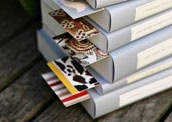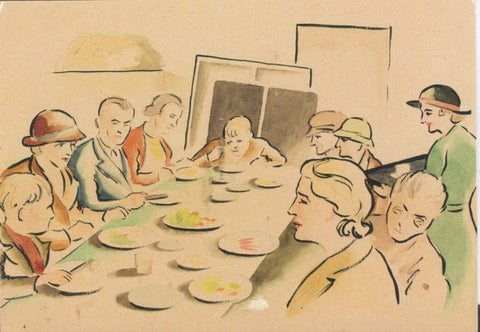- All our books
- Categories:
- Abroad
- Adultery
- America
- Architecture
- Biography
- Bloomsbury
- Childhood
- Cookery Books
- Country Life
- Diaries
- Education
- Family
- Fathers
- Gender and Race
- Grandmothers
- History
- House and Garden
- Humour
- Ireland
- London
- Love Story
- Men (books about)
- Men (books by)
- Mothers
- Poetry
- Politics
- Science Fiction
- Scotland
- Sex
- Shopping
- Short Stories
- Single Women
- Social Comedy
- Suffragettes
- Teenagers (books for)
- Thrillers
- Translations
- Victoriana
- Widows
- Woman and Home
- Women’s Place
- Working Women
- WWI
- WWII
- Young Love
- Persephone Merch.
- Audiobooks
- Book Tokens
- Notebook
- Persephone Classics
- Catalogue
Find a book

A Book a Month
We can send a book a month for six or twelve months - the perfect gift. More »
Order This Book

PREFACE BY LYDIA FELLGETT
240 pp
ISBN 9781910263273
Sylvia Townsend Warner was born in 1893; by the time war broke out she was an established novelist, and from 1936 onwards her short stories appeared mostly in The New Yorker (approaching 150 of them over the years, even more than Mollie Panter-Downes and Elizabeth Taylor, those other two British women writers who were promoted and revered by the New Yorker editors).
We have collected twenty-two stories dating from 1940 to 1946 and have republished them as English Climate (the title of one of the stories). Some were reprinted in two volumes, A Garland of Straw in 1943 and The Museum of Cheats in 1947, and one or two have appeared in anthologies since; but most Persephone readers will not have read the stories before and will find them something of a revelation. Lydia Fellgett writes in her Persephone Preface: ‘These stories show a writer seeking to understand what life was like in Britain at war. She worked quickly, without the haze of nostalgia, and (unlike her novels, which moved between the centuries) they were always contemporary, reflecting the texture of what was happening at that moment in time. Her wartime stories therefore epitomise what the historian Juliet Gardiner calls “fingertip history”: a telling of an age that is so close that you can still just about touch it.
‘Almost all the stories are set in the market towns and villages of Southern England’s countryside, with a few recurring characters providing snapshots of communities of women throughout the war. Occasionally a British reader senses a direct explanation of some quirk of specifically English culture for Warner’s American audience but, generally, the appeal they held for the New Yorker readership then carries over to the appeal they hold for a twenty-first century Persephone reader today. Funny, brilliantly written, at times utterly heart-breaking, delightfully sharp, dry, intelligent and full of memorable characters: they are stories that strike the reader as somehow true as only the best fiction can.
‘Persephone readers may have already encountered some of Sylvia Townsend Warner’s work for, compared to most other Persephone authors, she is “famous”. She was a bestseller in her lifetime, author of, for example Lolly Willowes (1926) and Mr Fortune’s Maggot (1927), and a recognisable name on the literary prize shortlists, and something of an eccentric public intellectual. She has also been recuperated as a “woman writer’, a “historical writer”, a “lesbian writer”, a “fantasy writer” etc. for forty years or so now. As with all other significant women writers of the twentieth century she has been compared to Virginia Woolf (shorthand for “good woman writer”) but, more often, her short stories in particular find her being compared to Jane Austen by readers and critics who understand them as amusing but essentially genteel sketches. There is an element of truth in this, yet it is far too reductive and misses the quite radical unconventionality of many of her mainly female characters.
‘The stories in English Climate are very much a companion to the other war stories published by Persephone Books. Like Mollie Panter- Downes, for example, author of Good Evening, Mrs Craven: the Wartime Stories (PB 8), Minnie’s Room (PB 34) and London War Notes (PB 111), all of which were also originally published in the New Yorker, Townsend Warner’s “concentration on the personal and the particular is well suited to the magnifying lens of the short story form” (Preface to Good Evening, Mrs Craven). Both of these writers excelled at small, everyday experiences: a woman’s angry hoovering when her pride is hurt; the terror of picking up a cold at a Mother’s Union Meeting; gossiping do-gooders in a knitting circle.
‘It is perhaps a combination of eccentricity and formality that best characterises Warner’s work, as well as her life: she was in some ways fiercely conservative, for example she was always a believer in excellent manners. But then in her sexuality and her politics she was a true radical – living openly with a woman as a Communist when both of those things were unheard of to most of British society. Hers was therefore an exceptional life. And yet it was also full of all the everyday dullness of a middle-class woman’s existence in the middle of the twentieth century.’
Endpaper
Endpapers are taken from Sailors, a 1940-1 Calico Printers Association dress fabric. In a private collection.
Picture Caption
Rest Centre and Communal Feeding; WRVS archive
Read What Readers Say
Madame J-Mo (blogger)
Kaggsy’s Bookish Ramblings
Northern Reader (via Instagram)
Categories: Country Life Humour Short Stories Social Comedy Woman and Home WWII
